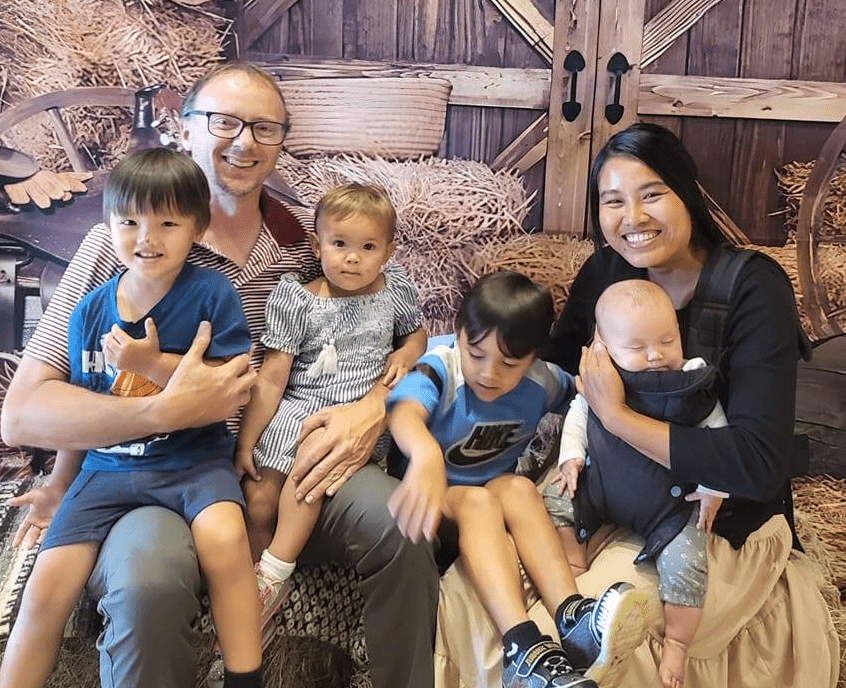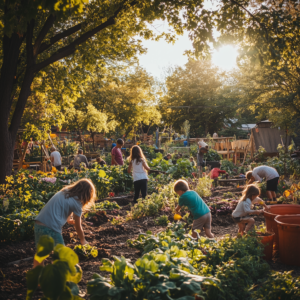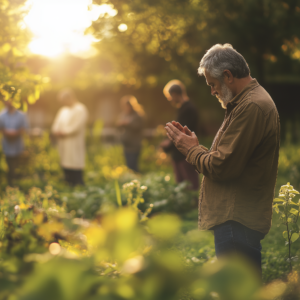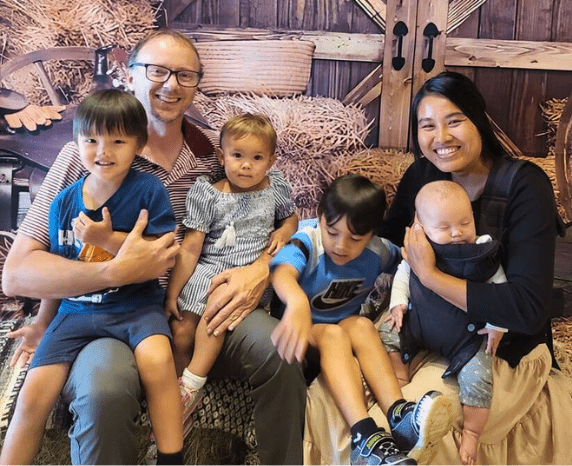

Empowering churches to grow in faith and self-sufficiency, one farm at a time.

Empowering churches to grow in faith and self-sufficiency, one farm at a time.

Welcome to Holy and Healthy Homesteads, where faith meets sustainability to create lasting change. Our journey began with a simple yet profound calling to serve others, particularly those in need, by planting self-sustaining churches that support both spiritual and physical well-being. This mission is rooted in our decade-long experience as missionaries in Thailand, where we witnessed the power of community, the challenges of dependency, and the importance of empowerment.
Our story began over ten years ago when my family and I felt a strong calling to serve as missionaries in Thailand. With a heart for the Gospel and a desire to make a tangible difference, we left our home to immerse ourselves in the culture and lives of the people we were called to serve. Our work took us to various communities, where we built relationships, shared the message of Christ, and provided practical help to meet the everyday needs of those around us.
We saw the smiles on children’s faces as we provided meals and educational materials, and we witnessed the gratitude of families who received support during difficult times. Our mission was clear: to share God’s love in both word and deed. Over time, however, we began to notice a recurring issue among the churches and organizations we partnered with—a heavy reliance on external donations. While these donations were essential and often lifesaving, they also created a sense of dependency that left churches vulnerable and unable to plan for the future with certainty.
 During our years of service, we became increasingly aware of the challenges that dependency on external funding posed to the sustainability of churches and community projects. We noticed several issues:
During our years of service, we became increasingly aware of the challenges that dependency on external funding posed to the sustainability of churches and community projects. We noticed several issues:
Loss of Autonomy: Churches that relied heavily on donations often felt beholden to their donors’ expectations. This pressure sometimes led them to prioritize the desires of external funders over the unique needs and spiritual direction of their own congregations. Instead of being guided solely by the Holy Spirit, these churches sometimes felt constrained by the need to maintain funding.
Lack of Local Ownership: When resources came primarily from outside, local church members and leaders often felt less responsible for their community’s well-being. This lack of ownership sometimes fostered a passive approach, where the local congregation expected help to come from abroad rather than engaging in problem-solving and community development themselves.
Economic Vulnerability: Churches dependent on foreign aid faced a precarious existence. Economic downturns, shifts in donor priorities, or unforeseen crises could lead to a sudden stop in funding. When this happened, churches found themselves struggling to maintain their programs, pay their staff, and even keep their doors open. This uncertainty made it difficult to plan for the long term or invest in meaningful growth.
Mission Drift: To keep donations flowing, churches sometimes felt compelled to align their mission statements, programs, or theological emphasis with the interests of their donors, rather than focusing on the needs of their local context. This could lead to a dilution of their core mission and a loss of focus on what God had uniquely called them to do in their community.
The Bible teaches us that “if anyone is not willing to work, let him not eat” (2 Thessalonians 3:10), emphasizing the importance of self-sufficiency and community responsibility. Seeing these problems, we realized that a new approach was needed—one that would empower churches to be self-sustaining while still honoring the spirit of generosity and support.
 Inspired by the Apostle Paul’s example of supporting his ministry through tent-making (Acts 18:3), we envisioned a model that combined spiritual growth with practical sustainability. Holy and Healthy Homesteads was founded on the belief that churches could thrive by integrating spiritual ministry with community-based farming, providing both physical sustenance and financial independence.
Inspired by the Apostle Paul’s example of supporting his ministry through tent-making (Acts 18:3), we envisioned a model that combined spiritual growth with practical sustainability. Holy and Healthy Homesteads was founded on the belief that churches could thrive by integrating spiritual ministry with community-based farming, providing both physical sustenance and financial independence.
Planting Self-Sustaining Churches: Our primary goal is to plant churches that are not only spiritually robust but also economically self-sufficient. By training church leaders and members in entrepreneurial skills and sustainable farming techniques, we reduce their reliance on outside donations. These income-generating activities help churches cover their operational costs, support their ministries, and serve their communities. Just as Paul’s tent-making provided for his needs and ministry, these churches can be a testimony of faith in action, meeting their needs while focusing on spreading the Gospel (Acts 20:34-35).
Creating Community Farms: Each church is partnered with a farm that grows non-GMO crops using permaculture principles. These farms serve multiple purposes: they provide food for the church community, generate income through the sale of produce, and offer educational opportunities for local residents. By teaching sustainable agriculture, we help communities work in harmony with nature, as God intended (Genesis 2:15). The produce grown not only sustains the church but also reaches out to the broader community, ensuring that no one goes hungry.
Education and Training: A cornerstone of our mission is equipping individuals with the skills they need to thrive. We offer workshops and training sessions on topics such as sustainable farming, entrepreneurship, and biblical stewardship. By imparting these skills, we empower people to take ownership of their lives and futures. Proverbs 22:6 teaches us to “Train up a child in the way he should go; even when he is old, he will not depart from it.” By investing in education, we are investing in the future of these communities.
Community Outreach: Our model emphasizes serving others, especially the most vulnerable. By using resources wisely and generating income through farming, churches can provide for widows, orphans, and the poor. James 1:27 calls us to care for those in distress, and our mission seeks to embody this biblical mandate. By meeting both spiritual and physical needs, churches become beacons of hope, demonstrating the love of Christ through practical service.
 Our ultimate vision is to see a network of churches that are not only spiritually strong but also capable of supporting themselves and their communities. We dream of churches that are hubs of faith, education, and sustainable living. In these churches, no one goes hungry, everyone has access to education, and each member feels a sense of ownership and responsibility.
Our ultimate vision is to see a network of churches that are not only spiritually strong but also capable of supporting themselves and their communities. We dream of churches that are hubs of faith, education, and sustainable living. In these churches, no one goes hungry, everyone has access to education, and each member feels a sense of ownership and responsibility.
We envision a future where these self-sustaining churches inspire others around the world, creating a ripple effect of empowerment and transformation. By equipping churches to stand on their own, we hope to reduce the dependency on foreign aid, allowing churches to plan confidently for the future and focus on their God-given missions. Our goal is to fulfill the Great Commission, not just by making disciples but by empowering disciples to be self-reliant and to care for their communities (Matthew 28:19-20).
Join us on this journey. With your support, we can create a world where churches are thriving, communities are resilient, and the love of Christ is evident in every action. Learn more about how you can be a part of this mission at holyhealthyhomesteads.com

As 10-year veteran missionaries to Thailand, our family is dedicated to living out our faith through service. With our four kids by our side, we run Holy and Healthy Homesteads, combining our love for Christ with sustainable farming to empower communities and spread the Gospel.